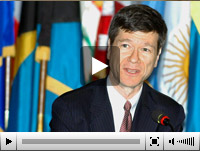- English
Cátedra de las Américas
Eleventh Lecture - Jeffrey Sachs
Eleventh Lecture - March 14, 2006
"New Approaches to Economic Directions in Latin America"
Orador:
Jeffrey Sachs, Director, Earth Institute at Columbia University, Quetelet Professor of Sustainable Development, Professor of Health Policy and Management and Special Advisor to the UN on the Millennium Development Goals
Secretary General, Embajador Valère, distinguished Embajadors, ladies and gentlemen, and, I understand, friends from around the Hemisphere by live video, let me say how honored I am to be your guest today and how lucky I feel to be in these most distinguished and historic halls to join you and to ponder the economic future of the Americas.
For me it’s always a kind of homecoming in my own career, because my first work and first love in the field of economics and economic development was in Bolivia, where I was so lucky to be warmly greeted and welcomed, and I’ve felt such a home and friendship for more than two decades now, and from the work in Bolivia to have the opportunity to have worked in all parts of our hemisphere on the challenges of economic development, disease control, and all that goes with it. So for me, while in the last few years I’ve been focusing more on what is, sad to say, the most urgent problem on our planet, and that is the life-and-death struggle in Africa of millions of people dying of diseases and dying of mass hunger right now, it is wonderful for me to be back among so many friends and colleagues from past years, and I hope that it means a relationship that continues for many years to come.
I can tell you, certainly from the perspective of the work now that I’ve been called upon to do for the Secretary General of the United Nations, that in so many ways, Latin America is a blessed region, especially when you see the terrible disease burdens in Africa––often life expectancy is only 40 years, the massive AIDS pandemic, the drought and hunger that afflict so much of that continent, the extreme poverty. With all of the economic challenges that Latin America faces, Latin America has so many wonderful strengths and achievements. We should keep that in perspective as well.
Latin America is a region today of great stability politically, though not uniformly or exactly where one would hope in every case. It’s a region where life expectancy tends to be 70 years or higher in most of the region, though that draws our attention to Haiti and some other pockets of extreme poverty that we need to pull our full forces together to address. Basic challenges that are still being fought, for example, in Africa, of children’s education, of mass literacy, and of access to safe drinking water have largely been won throughout the continent. Again, not to diminish the remaining challenges in some places, but to say that the base lines that we’re discussing are, fortunately, base lines well above the minimum, base lines where current conditions are in many ways strong, particularly in health, for example, and in many ways even above what the statistics on economics show, because this is a region where measured incomes are sometimes low but quality of life is often even higher than is seen. I think that that’s a point to keep in mind.
I believe that it’s important to remember all these accomplishments, including what I’ve observed over the 20 years of my own engagement in this region. When I began in July 1985 in Bolivia, virtually the entire region was still under military rule or was in a very fragile process of transition. There was active war under way in places like Central America, which is now a region of solid democracies and this is a great achievement. So this is the backdrop that I think is important to keep in mind.
But it is also a region where there are issues that I believe continue to challenge us , in terms of economic growth, despite the political improvements, and advances in disease control and literacy.

